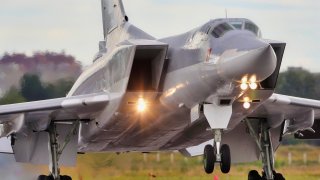The Russian Military Has 'Nuclear' Plans to Stop an Invasion by China
Despite the dramatic headlines, the leaked Russian military documents that discuss the conditions (including a Chinese invasion scenario) a beleaguered Moscow might resort to using nuclear armaments is not surprising. Nor should anyone be puzzled as to why the Russian military has contingency plans to cope with a possible Chinese invasion.
Despite the dramatic headlines, the leaked Russian military documents that discuss the conditions (including a Chinese invasion scenario) a beleaguered Moscow might resort to using nuclear armaments is not surprising. Nor should anyone be puzzled as to why the Russian military has contingency plans to cope with a possible Chinese invasion.
After all, one reason why progress was never achieved on drastically reducing tactical nuclear weapons, despite such proposals being on the table after the success of the 1987 INF Treaty, was that Russia has always seen tactical nuclear weapons as a last-ditch capability to protect the Russian state in the event of the complete collapse or defeat of its conventional military capabilities.
So, do these leaks, particularly about Russian plans to use such weapons to stop a Chinese invasion, change anything?
First, it is the job of military establishments the world over to envision and prepare for any scenario, no matter how unlikely. The United States maintained war plans for an invasion of Canada well into the twentieth century. Part of the calculations that informed the U.S. position on accepting limits on warship construction at the various naval conferences of the 1920s and 1930s was the possibility of a future conflict with Great Britain. Indeed, the very notion of capabilities-based planning (as opposed to scenario-based planning) assumes that the United States must be prepared to overcome capabilities rather than trusting the hands that wield those capabilities will be friendly and will not use them against the United States or its interests.
While these documents were written between 2008 and 2014 during the Obama administration (in American terms, ancient history), the Russian general staff takes a long-term view. Current partners today—including Turkey and China—have, in the past, been strategic rivals. The Russian national security establishment remains guided by the maxim of Tsar Alexander III, who remarked that Russia's only true and enduring allies are its army and navy. In other words, Russia views its partnerships in fundamentally transactional and situational terms. Ankara and Beijing opposed Moscow in the past but cooperate today precisely because it is in their interests to do so. If that calculus changes, the relationship is also altered.
The founding editor of this journal, Owen Harries, once remarked that the United States “offers alliance on easy terms.” Washington assumes that allies would never have cause to turn against it. In contrast, Moscow believes that if it shows any sign of weakness or debilitation, its current strategic partners will see an opportunity to change the parameters of their relationship to their advantage.
We have already seen this in the last two years as Russia expends the bulk of its power pursuing its “special military operation” in Ukraine while suffering considerable military losses from Ukrainian resistance plus economic damage imposed by Western sanctions. Under these conditions, both Turkey and China have been able to press for revisions to their partnership with Russia, especially in economic terms. Ankara is vital to the success of the “Eurasian roundabout,” which has enabled Moscow to blunt some of the impact of Western sanctions and shift the balance in both the Caucasus and the Black Sea in Turkey's favor. China has been able to change the terms of trade in getting Russian resources priced in renminbi and for China to receive additional discounts. If Russian power continues to decline, what might come next?
Two decades ago, Rajan Menon, in these pages, raised the prospect of a “reverse Manchurian” scenario where China, even if it did not formally annex formerly Russian territories in Siberia and the Far East (which previously had been part of the Chinese Empire) would be able to exercise de facto control. This feeds into the Kremlin’s long-standing geopolitical nightmare of a weakened Russia subdivided into Western European, Middle Eastern, and Chinese spheres of influence.
Might these documents have been strategically leaked—at this particular point in time—to not so subtly remind China (and the United States) that Russia is contemplating a lower threshold for nuclear use as a warning against taking advantage of Russian weaknesses? The beauty of the leak is that the Kremlin can formally distance itself from the documents (and even claim that the documents are outdated) while still achieving its purpose. China is reminded that tangling with Russia would be costly, and Beijing’s aims and desires can be better accommodated by continued cooperation within the existing framework of China-Russia relations. Yes, the bear might be sick—but its claws remain sharp.
About the Author
Nikolas K. Gvosdev is the director of the National Security Program at the Foreign Policy Research Institute.
Image: Shutterstock.


